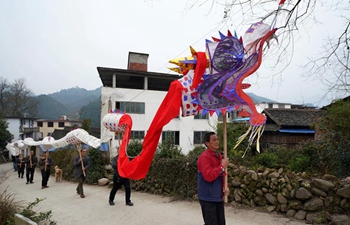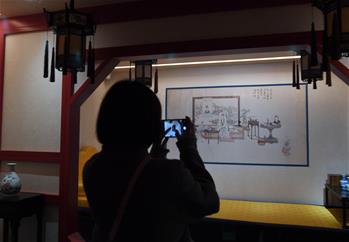BAGHDAD, Jan. 30 (Xinhua) -- "Iraqis were and are still victims of recurrent upheavals. Through my films, I depict the Iraqi individual as the victim who rises to become a hero," an Iraqi filmmaker told Xinhua.
On a sunny afternoon in Baghdad on the bank of Tigris River, Mohammed al-Daradji, a filmmaker and the director of the Iraqi Independent Film Center, told Xinhua about his persistence to introduce his homeland to the world through his films.
"The world's acquaintance of Iraqis doesn't transcend more than the casualty statistics. Through my films, I tried to introduce the human side of Iraqis to the world," said Daradji, who has represented Iraq at the Oscars for three times.
Born and raised in Iraq, Daradji, 40, studied theater in Iraq before immigrating to the Netherlands in mid-1990s.
He obtained a Master's degree in cinematography and directing in Britain, and his films earned recognition and awards from around the world.
His latest film, The Journey, or al-Rihla in Arabic, was released in Iraq in March 2018, and was chosen by Iraq's Ministry of Culture to represent the country in the Oscars. However, the film did not make it to the nominations.
"The Journey was my third film to represent Iraq in the Oscars. A few Iraqi films are made every three or four years, thus to see a film representing Iraq in the Oscars is very important," Daradji said.
In The Journey, Daradji delved into the mindset of an Iraqi female suicide bomber, who was reluctant to blow herself up in 2006 at a crowded railway station in Baghdad on the first day of Eid al-Adha, also known as the Feast of Sacrifice.
In this movie, the Iraqi director not only highlighted the grave impacts of the U.S.-led invasion on Iraqi society, but also presented an alternative approach to the character of the U.S. soldiers in Iraq.
In one scene of the movie, three troops aggressively entered the main hall of the railway station and unashamedly mistreated a little girl selling flowers. In another scene, the troops abused a female suspect.
Within the sphere of Baghdad's railway station, Daradji, through the characters and their roles, explicitly touched upon an array of social issues in the Iraqi society, such as harassment, male dominance, child labor and forced marriage.
Prior to a screening of The Journey in the French Institute in Baghdad, French Ambassador to Iraq Bruno Aubert handed the Grand Prize from the Paris-based Arab World Institute to Daradji for best film.
The best actress award was handed to Zahraa Ghandour, an Iraqi-Lebanese actress who played the leading role of a female al-Qaeda member named Sara in the film.
The screening was followed by a discussion where the audience had the chance to interact with the director and leading actress.
When asked about how the U.S. viewers received the film, Ghandour said "I have already sensed a tangible sympathy from U.S. viewers toward Sara."
"But instead of feeling guilty for what happened to the people of Iraq, I wish they spread awareness that Iraqis are not bad people," she added.
Daradji disclosed his intention to establish a "mobile cinema," travelling across Iraqi cities to give the displaced people in refugee camps and in the areas liberated from Islamic State (IS) militants the chance to watch his films.
The Journey was the first Iraqi film to be released in cinemas across the country since 1991, and it also reached the audience in the Arab world as well as Europe and the United States.
The 13-year severe UN sanctions imposed on Iraq in early 1990s and a series of wars and unrest following the U.S.-led invasion in 2003 affected Iraq's all aspects of life including the country's film industry.
With or without substantial support from the Iraqi government, Daradji said he and other independent filmmakers are aiming to "put Iraq on the global cinema map."

















